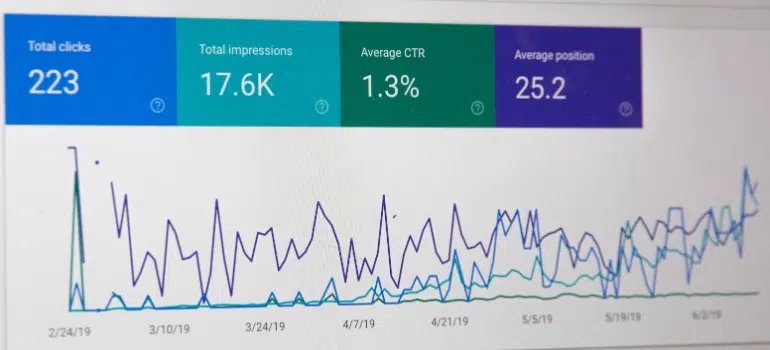The moving industry faces its own set of challenges when it comes to digital marketing. Traditional marketing methods often don’t fully meet the needs of moving companies. It’s important to use a more tailored approach. Deciding between organic SEO vs PPC is a key first step. PPC can make you visible quickly, but organic SEO helps build your company’s reputation and trust over time. As a moving business, you need to adjust your marketing plans to fit these methods for the best results. Looking into movers marketing can provide detailed advice and strategies. This kind of marketing support can help your moving company get noticed in a crowded market by finding the right mix of organic search efforts and paid advertisements.
Which should you use?
So, why is search engine optimization such a big thing to begin with? Well, businesses of all types and sizes have fully realized just how crucial online marketing is. And search engines are essentially the driving machines of online marketing. In fact, some studies estimate that around 80% of people find the website they’re looking for via search engines. And when we’re talking about someone looking for a specific service for the first time, there’s simply no getting around search engines.
That’s why any company worth its salt would do well to hire a company for SEO to help them achieve a good search engine ranking. That’ll be crucial for making sure that your website is presented to the target audience as much as possible. But here lies an interesting question: what method for lead generation should you use – organic SEO vs PPC? On the one hand, you’ve got natural methods of achieving a high ranking in search results. And on the other, you’ve got PPC or Pay Per Click methods, meaning using purchased Google ads and sponsored links. So, is one better than the other?

Let’s get one thing out of the way – if you use these methods correctly, both will result in lead generation via search engines, as you’ll constantly be at the top of search engine results for your niche keywords. So, the real question here is which method proves to be more productive. And as you’ll see in detail below, both methods have their own pros and cons.
Impact of search engine algorithm changes
Search engine algorithm updates significantly impact both organic SEO and PPC. These changes can suddenly impact a website’s visibility in search results. Moving companies should stay up to date with these changes, as quick adaptation ensures a consistent online presence. It’s about adjusting tactics, not just for short-term gains, but for sustainable growth. Moving companies should focus on quality content and user experience to boost organic SEO.
For PPC, analyzing and changing keywords and ad strategies is essential. Regularly monitoring and adapting to these updates helps maintain the upper hand. Incorporating local SEO for movers into their strategy can significantly enhance visibility in local searches, a critical factor for businesses in this industry.
Advantages of organic SEO
If you’re wondering how to increase your customer base and whether to use organic SEO vs PPC; you genuinely need to get into the details. And let’s have one piece of information out in the open right away; organic SEO results are better than PPC in one key regard; people click on paid ads far less than on results that are generated organically. We’re talking about a vast disparity, where organic SEO has around eight times higher chances of generating a lead.
It’s no wonder that organic results are viewed as far more trustworthy. Also, over these few decades of using search engines, people have accustomed their eyes to immediately looking at the top organic results. Research shows that they barely consider the paid ads on the side.
Taking this into account, the choice between PPC and organic SEO may seem crystal clear, defeating the entire point of writing an entire article about it. But, as with most things; there’s another side of the coin. And in this case, the other side of the coin is – money!
Advantages of PPC
In the struggle of organic SEO vs PPC, the latter has one big thing in the ‘pro’ column: it’s extreme speed. If you run a PPC campaign well, there’s no reason you wouldn’t land on the first page for your chosen keywords within a day. But, the trick is in the cost. Pay Per Click campaigns are just what their name implies, meaning that any click may cost you anything from a couple of pennies to quite a few dollars, not to mention stuff like brand bidding. Also, companies rarely do PPC campaigns in-house; you usually need to hire a professional digital marketing company to execute one successfully. Which, in turn, means accruing additional costs.

That’s why trade organizations estimate that PPC campaign budgets are far larger than the money needed for organic SEO; in fact, PPC efforts make almost 90% of digital marketing budgets! With the expensiveness of PPC in mind, the natural question poses itself; why do people use it in the first place?
Comparative analysis: Time and resources
Comparing the time and financial investments between organic SEO and PPC is crucial for the moving industry. Organic SEO demands more time upfront but less financial investment. In contrast, PPC for moving companies requires more immediate financial input but less time. Here’s how organic SEO vs PPC measure up:
Organic SEO:
- Time-intensive, requiring ongoing content creation and optimization.
- Financially more affordable, focusing on long-term growth.
- Benefits accrue over time, enhancing brand credibility and trust.
PPC:
- Less time-consuming, with faster campaign setup.
- Higher financial investment for instant visibility.
- Offers immediate results, ideal for short-term objectives.
Which one should you choose?
For moving companies, the choice between organic SEO and PPC depends on their marketing goals. Organic SEO is a strategic investment for long-term growth, building a strong online presence that will benefit you over time. PPC, meanwhile, is best used for quick results and targeted campaigns, especially for promotions or seasonal peaks. Both strategies have their place, and a balanced usage often yields the best return on investment. Moving companies should consider their budget, immediate needs, and long-term goals to decide the right mix of organic SEO and PPC for their marketing strategy.
A time and a place
As we’ve mentioned above, the main advantage of PPC is its speed, and its biggest disadvantage is its cost. But there’s a reason both of these exist and are actively used for lead generation. It’s simply a matter of knowing when is the right time for these different lead generation methods. For example, when your company is just starting out – PPC is a great way to build some awareness for your brand. When you’re working within a limited budget for a specific event, organic SEO vs PPC is a no-brainer; you go with the latter. But once that’s done, you still need SEO to produce long-term results that don’t involve paying a huge amount of money on a daily basis.

Combining strategies for optimal results
Blending organic SEO and PPC effectively can yield optimal results for moving companies. The key lies in a strategic, phased tactic. Initially, prioritize PPC to gain immediate visibility and capture urgent market needs. Simultaneously, build a strong organic SEO foundation. This mixed strategy should evolve over time, gradually emphasizing organic SEO as it grows. Here’s a suggested timeline for integrating both strategies:
Months 1-3:
Focus on PPC for quick market entry and immediate lead generation.
Begin building organic SEO groundwork.
Months 4-6:
Start reducing PPC as organic SEO gains momentum.
Increase content creation and keyword optimization for SEO.
Months 7 and beyond:
Maintain a minimal, targeted PPC campaign.
Concentrate on strengthening organic SEO.
Measurement is crucial. Tools like Google Analytics provide insights into traffic sources and user behavior. Metrics such as click-through rates, conversion rates, and keyword rankings are vital for evaluating the success of combined strategies. Staying aware of SEO trends for movers is also important to adapt and perfect strategies. Regularly revisiting and adjusting the mixture of organic SEO and PPC ensures that moving companies stay responsive to market dynamics. In turn, this should optimize online presence and maximize return on investment.
The essential role of organic SEO and strategic use of PPC
For those constructing a long-term brand, organic SEO is not only a great option; but an utter necessity. Considering limited digital marketing budgets, and the long-term effectiveness of SEO that’s far bigger; you should opt for it in the long term, and only use PPC for a limited time period.






